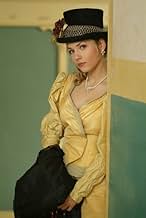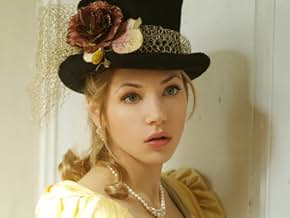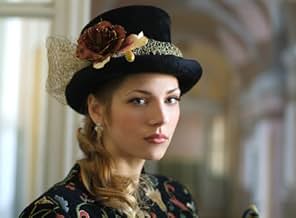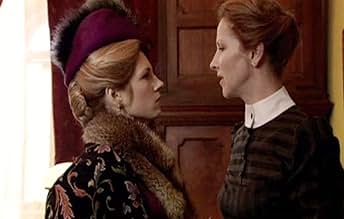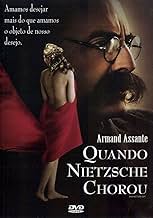VALUTAZIONE IMDb
6,4/10
5071
LA TUA VALUTAZIONE
Aggiungi una trama nella tua linguaViennese doctor Josef Breuer meets with philosopher Friedrich Nietzsche to help him deal with his despair.Viennese doctor Josef Breuer meets with philosopher Friedrich Nietzsche to help him deal with his despair.Viennese doctor Josef Breuer meets with philosopher Friedrich Nietzsche to help him deal with his despair.
Michal Yannai
- Bertha
- (as Michal Yanai)
Ayana Haviv
- Singer - 'Hymnus an den leben'
- (non citato nei titoli originali)
Recensioni in evidenza
I read the book several years ago, and didn't remember much of it, beyond being fascinated by the psychological-philosophical explorations of the legendary characters and intrigued by the migraine issues that Nietszche and Breuer attempt to solve. But the book is deeply intellectual, and it was difficult to imagine it translated to the screen. Unfortunately, the director's interpretation falls very limp indeed, despite valiant attempts by a cast of worthy actors.
Melodrama substitutes in most scenes for subtlety and quiet depth. Two-dimensional beauty in the female characters substitutes for the much harder to convey inner beauty.
I found the heavy-handed artificial accents maintained by all to be especially distracting, if not constantly irritating -- the thick German/Austrian/Russian accents were like bad scenery pulling the focus from any authentic expression of the characters. The wisdom of Nietszche is disappointingly obscured in this mediocre effort.
"And if you gaze for long into an abyss, the abyss gazes also into you."
Melodrama substitutes in most scenes for subtlety and quiet depth. Two-dimensional beauty in the female characters substitutes for the much harder to convey inner beauty.
I found the heavy-handed artificial accents maintained by all to be especially distracting, if not constantly irritating -- the thick German/Austrian/Russian accents were like bad scenery pulling the focus from any authentic expression of the characters. The wisdom of Nietszche is disappointingly obscured in this mediocre effort.
"And if you gaze for long into an abyss, the abyss gazes also into you."
It is not a great movie. It is not a masterpiece. It may be boring and fake at first sight. But... A film about a Nietsche. Not very different of the philosopher. The character is seductive, power and Armand Assante is brilliant in his skin. The atmosphere is carefully recreated. Colors, gestures, social conceptions are pieces of a small visual museum. So, the movie is a good introduction to understand the shadows of XIX century end. For look the existence with the eyes of men of a special way to discover the essence of to be. Certainly, the film gives only sketches of great people. Lou Salome is more than strange muse of a philosopher and Nietsche is prophet in another sense than the character. No bad, no extraordinary. Only good subject of reflection. And introduction to cultural scene.
Fine production values, a dry sense of humor throughout, literate script, decent casting (Assante transcends his usual "heroics" and plays a crumbling soul nicely and Cross is always workmanlike and solid), and, slyly, the film (as the book did) finally gives Nietzsche credit for inventing modern psychoanalysis (since Freud, et al, in the field stole from his works outrageously and lavishly, without assigning him the proper credit for his startlingly original insights into the world-historical human, all too human capacity for self-deception).
A tough work for an adaptation, but this movie succeeds where something like "Freud" dismally collapsed into timid clichés.
Nietzsche would have gotten many a devilish laugh out of this work's visual craftiness.
And appreciated being treated, not as a cartoon "Overman" idol, but a struggling, flawed, tragic-comically-profound human.
"Ecce Homo", his anti-"autobiography" warned those who followed not to take him too seriously.
If this film stimulates a few people to pick up his "Joyful Wisdom" (La Gaya Scienza) or "Dawn", it will have made its honorable point.
Yalom was, in essence, giving Nietszche a posthumous brother's embrace for his loneliness and struggle and brilliance and scorn and lack of recognition while he lived.
This movie does the same.
To a guy, who, friendless and abandoned and ignored through much of his writing life, still affirmed the Universe and humanity in the words:
"Man would rather have the Void for a purpose than be void of purpose." -F.N.
Worth a viewing.
A tough work for an adaptation, but this movie succeeds where something like "Freud" dismally collapsed into timid clichés.
Nietzsche would have gotten many a devilish laugh out of this work's visual craftiness.
And appreciated being treated, not as a cartoon "Overman" idol, but a struggling, flawed, tragic-comically-profound human.
"Ecce Homo", his anti-"autobiography" warned those who followed not to take him too seriously.
If this film stimulates a few people to pick up his "Joyful Wisdom" (La Gaya Scienza) or "Dawn", it will have made its honorable point.
Yalom was, in essence, giving Nietszche a posthumous brother's embrace for his loneliness and struggle and brilliance and scorn and lack of recognition while he lived.
This movie does the same.
To a guy, who, friendless and abandoned and ignored through much of his writing life, still affirmed the Universe and humanity in the words:
"Man would rather have the Void for a purpose than be void of purpose." -F.N.
Worth a viewing.
Knowing nothing of the book, and based solely on the DVD cover and description I expected a disappointingly shallow, titillating pseudo-intellectual romp through the fields of pretense. But the portrayal of the rare humanity of these characters as they confronted their obsessions and limitations drew me into rapt attention at the next plot development. Perhaps I'm just shallow and easily amused, but this story gave a fairly good look at a decent man, Joseph Breuer, and his struggle to really feel his humanity. This is an important story, one rarely told because how many story tellers have been through the fire of transformation to live for real? Where do you find an audience willing to sit through something they're desperately trying to avoid themselves? Maybe package it as a shallow and titillating pseudo-intellectual romp. Sure there were times when I saw through the weave of the story, for a moment I even saw Assante speaking lines rather than Nietzsche talking but for the most part this story was to me a real story of people really evolving right before our very eyes. That's not something you're going to see every day.
Josef Breuer and Sigmund Freud did work together and they did collaborate on a book about Anna O, who was most likely Bertha. Lou Salome did have relationships with Nietzsche and Freud and many others. All of these things are true.
But, Breuer did not treat Nietzsche. That is in the author's (Irvin D. Yalom) imagination, and what a great imagination it was. The story makes a super philosopher seem human, with frailties that we all suffer. It also makes for an interesting story of how psychoanalysis came about. I can imagine that it really did develop this way as Breuer and Feud discovered what worked and what didn't. We see free association or "chimney sweeping" as Bertha called it, we certainly see transference, and much more as the discipline developed.
Ben Cross was excellent, Armand Assante gave the best performance I have ever seen from him, Jamie Elman let us see Feud as a young man, Katheryn Winnick certainly makes me want to see her again, and Michal Yannai was delightful.
A great period piece that will delight all who care about philosophy and psychology.
But, Breuer did not treat Nietzsche. That is in the author's (Irvin D. Yalom) imagination, and what a great imagination it was. The story makes a super philosopher seem human, with frailties that we all suffer. It also makes for an interesting story of how psychoanalysis came about. I can imagine that it really did develop this way as Breuer and Feud discovered what worked and what didn't. We see free association or "chimney sweeping" as Bertha called it, we certainly see transference, and much more as the discipline developed.
Ben Cross was excellent, Armand Assante gave the best performance I have ever seen from him, Jamie Elman let us see Feud as a young man, Katheryn Winnick certainly makes me want to see her again, and Michal Yannai was delightful.
A great period piece that will delight all who care about philosophy and psychology.
Lo sapevi?
- Citazioni
Josef Breuer: How could I have given up everything?
Nietzsche: You'd given up everything long before you met me.
Josef Breuer: Yes, but now I have nothing.
Nietzsche: Nothing *is* everything. In order to grow strong, you must first sink your roots deep into nothingness. Learn to face your loneliest loneliness.
I più visti
Accedi per valutare e creare un elenco di titoli salvati per ottenere consigli personalizzati
- How long is When Nietzsche Wept?Powered by Alexa
Dettagli
- Data di uscita
- Paese di origine
- Siti ufficiali
- Lingua
- Celebre anche come
- Nietzsche Ağladığında
- Luoghi delle riprese
- Azienda produttrice
- Vedi altri crediti dell’azienda su IMDbPro
- Tempo di esecuzione1 ora 45 minuti
- Colore
- Mix di suoni
- Proporzioni
- 1.85 : 1
Contribuisci a questa pagina
Suggerisci una modifica o aggiungi i contenuti mancanti



